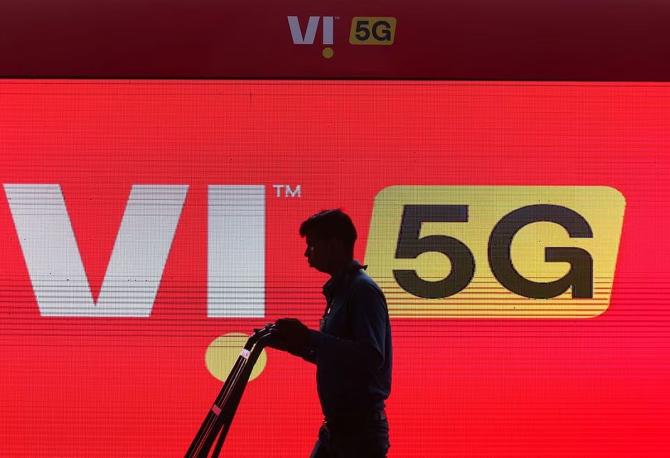In August 2021, Nick Read, chief executive of Vodafone Plc at the time, did not mince his words while speaking about the India business in an earnings call.

Replying to an analyst’s question on Vodafone Idea, a venture with the Aditya Birla Group that had piled on huge debts and worrisome losses, Read described it as a highly stressed situation that “they (Vodafone Idea) are trying to navigate…
"We, as a group, try to provide them as much practical support as we can, but I want to make it very clear, we are not putting any additional equity into India.’’
The distinction between “they’’ and “we’’, may have been intended to pacify shareholders, but, for more than 30 months since then, the Newbury-headquartered telecom major has not put any money into the India business, which it had acquired amid much fanfare in 2007 in a deal
with Hutchison.
The UK telco’s rough ride in India started in 2009, over a retrospective tax demand that was set aside later, but it has lately been in the news for a variety of reasons: Once again missing the deadline to raise funds, trouble with Indus Towers, its comment opposing a sunset date for phasing out 2G, delay in rolling out 5G services while betting on 4G, and a shrinking customer base.
The unexpected silver lining is a growing Arpu, or average monthly revenue per user, a key indicator of a telco’s health.
Vodafone Idea did not respond to the Business Standard’s queries related to its financial problems and the way ahead.
Highs and lows
First things first. In August 2018, when Vodafone and Idea Cellular merged, Vodafone’s own market share was 19.34 per cent and Idea’s 18.61 per cent, for a combined market share of nearly 38 per cent, with 441 million subscribers.
The combined entity, Vodafone Idea (Vi), was expected to put up a stiff fight against leaders Bharti Airtel and challenger Reliance Jio.
Things have turned out differently.
By the time the merged entity was rebranded Vi, in September 2020, its market share had fallen to 25.7 per cent, with 295.4 million mobile users.
As of November-end last year, it had fallen to 19.4 per cent, half of the 2018 level, making the current telecom market look more and more like a
Jio-Airtel duopoly.
The price movement of the Vodafone Idea stock reflects the story of a telco in limbo.
The highest price the Idea Cellular shares hit was Rs 123 on April 17, 2015 — three years before Vodafone merged into it.
In 2018, the year of the merger, the highest was Rs 71.27 and the lowest Rs 19.39.
The following year saw Rs 23.01 as the highest and Rs 2.61 as the lowest, and a peak of Rs 16.25 and a trough of Rs 5.70 in 2023.
This year began on a better note, with a 52-week high of Rs 18.40 on January 1.
If the 52-week stock price high at the start of the year was based on hopes of a revival, the Arpu also reflects expectations from a telco that prides itself on its high-value customers.
Even as it has lost subscribers continuously, its Arpu has risen for 10 straight quarters, as 2G customers have moved to 4G.
The company has credited the Arpu growth to more customers regularly moving into higher Arpu plans.
However, as of Q3 of FY24, Vi’s Arpu of Rs 145 continues to trail Jio’s Rs 181.7 and Airtel’s Rs 208 by a distance.
Now about the telco’s 4G bet.
At the end of December 2023, Vi had 124.7 million 4G subscribers — 58.3 per cent of its overall subscribers.
Mirroring the Arpu growth, its 4G subscribers have risen for 10 straight quarters.
On the backfoot
However, central to Vodafone Idea’s situation is subscriber erosion. Data from the Telecom Regulatory Authority of India show Vodafone Idea, where the Union government is the largest shareholder with 33.1 per cent, has lost 221 million wireless subscribers from the time of merger to touch 224.41 million as of November-end 2023.
Its subscriber number now is lower than what Jio had as a distant third in 2018, when Vodafone and Idea had merged.
Since then, the total wireless subscriber base in India has grown from a little over 1 billion to 1.15 billion.
The funding ordeal follows from there. While discussions with investors continue, the company has missed several self-imposed deadlines to raise funds, with the latest being December 31, 2023.
Akshaya Moondra, chief executive officer, Vodafone Idea, said in a post-earnings call that a commitment by the promoters to put up Rs 2,000 crore towards meeting payment obligations remained active.
As of December 2023, Vi had total gross debt of Rs 2.14 trillion, excluding lease liabilities.
This included deferred spectrum payment obligations of Rs 1.38 trillion.
The telco also has an adjusted gross revenue liability of Rs 69,020 crore to the government.
In the next 12 months, it is staring at the repayment of Rs 5,400 crore worth of debt.
Tariff hikes by the company could be of help if competition, too, took that path.
Last July, Vi increased the price of its entry-level unlimited plan to Rs 179 per month from Rs 99.
It also reduced the validity of the base level Rs 99 plan to 15 days from 30.
However, the telco’s indifference to 5G is a worry. Back in 2018, Vodafone and Idea's joint merger statement spoke of accelerating the pan-India expansion of wireless broadband services using 4G+ and 5G technologies.
More than five years later, Reliance Jio provides 5G services in 7,764 cities and Airtel in 5,000.
Vi has conducted 5G trials in Pune and Gandhinagar, but is yet to launch commercially.
Moondra, in analyst calls, admitted that the lack of 5G had put it on the backfoot.
Vi, where Vodafone and Aditya Birla Group hold a combined 50.4 per cent stake, has already got an unusual government support in the midst of intense financial stress.
It is up to the promoters now whether they want to get on to the front foot, or stick to the old plan of not throwing good money after bad.











